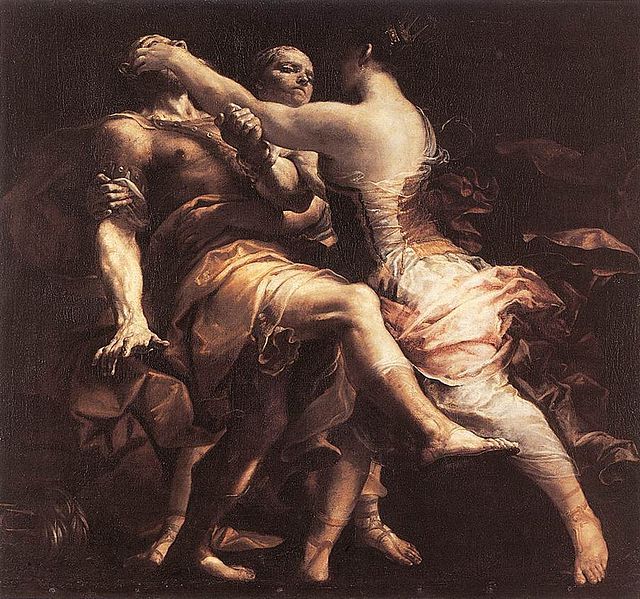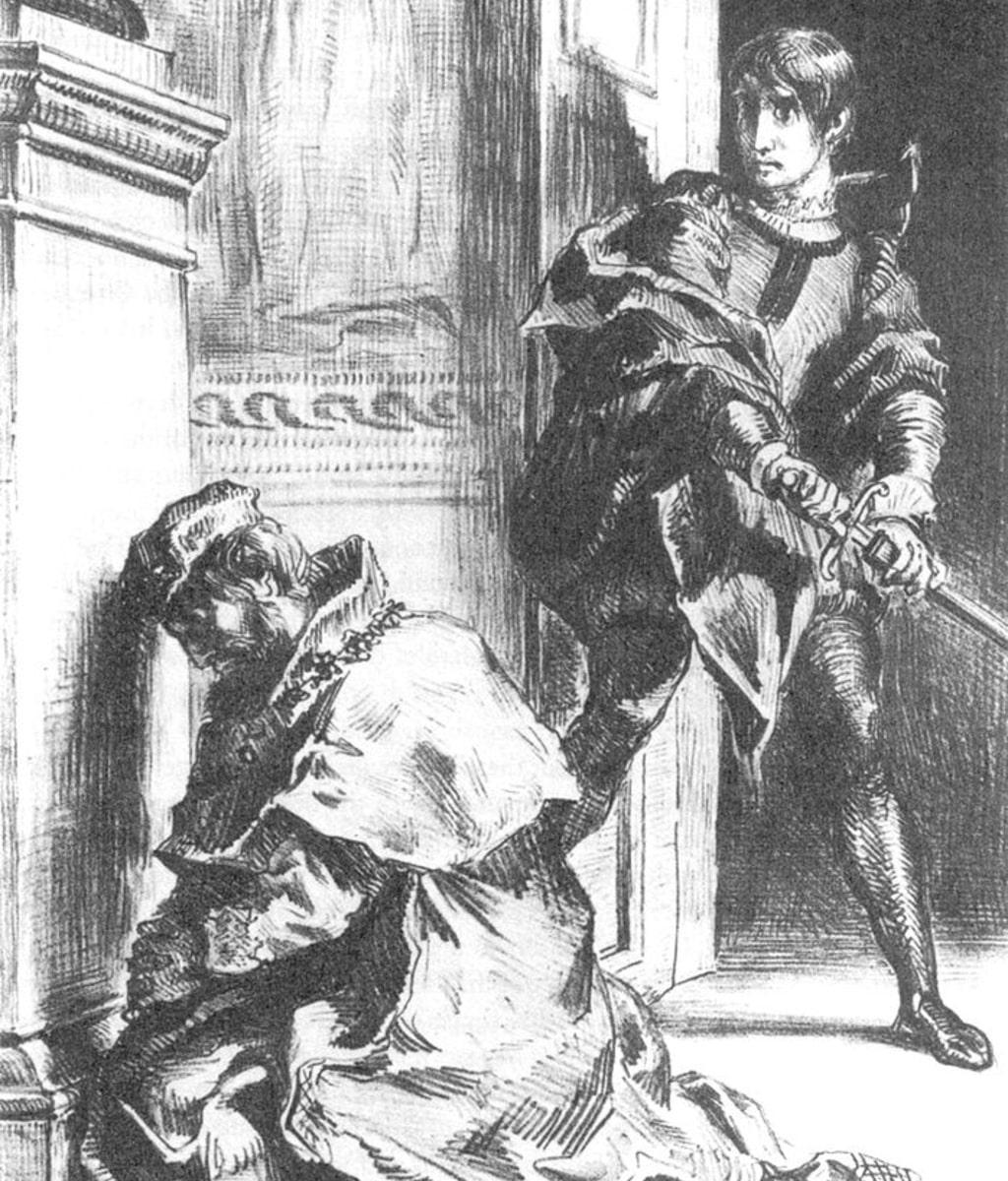The play Hamlet is a Shakespearean tragedy that dates back to the 1600s. It follows young Prince Hamlet as he struggles to cope with the loss of his father, his mother’s hasty remarriage to his uncle, and the truth behind the King’s death: His new stepfather was the one who murdered his father.
Shakespeare presents many conflicts within his play, both internal and external. Some of the psychological conflicts that are shown are Prince Hamlet’s anger, King Claudius’ regret, and finally Prince Hamlet’s ongoing battle with depression.
Throughout the play, Hamlet’s emotions seem to drive his actions. This is evident in Hamlet’s second soliloquy found in 2.2. After watching a play performed by a group of traveling actors, Hamlet experienced a fit of anger caused by the dedication and feeling the actor was able to portray through his words.
Hamlet compared this rendition of “Hecuba” to his own life, and lack of action to kill King Claudius in order to avenge his father’s murder. This is evident through Hamlet’s speech:
“But in a fiction, in a dream of passion,
Could force his soul so to his own conceit
That from her working all his visage wanned,
Tears in his eyes, distraction in his aspect,
A broken voice, and his whole function suiting
With forms to his conceit? And all for nothing!
For Hecuba!
What’s Hecuba to him, or he to Hecuba
That he should weep for her? What would he do
Had he the motive and the cue for passion
That I have?
(2.2.552-62)
This quote portrays Hamlet’s anger, both towards the player based on his passion and dedication portrayed through his acting, and towards himself for his lack of action. Hamlet compares this actor’s ability to bring an offspring of emotion to the audience to his own situation, and his inability to effectively portray his thoughts and feelings as well as the truth about his father’s death. This is also evident through Hamlet’s speech later on within his soliloquy:
“Am I a coward?
Who calls me villain? Breaks my pate across?…
…Why, what an a** am I! This is most brave,
That I, the son of a dear father murdered,
Prompted to my revenge by heaven and hell
Must like a wh*re unpack my heart with words…”
(2.2.571-86)
Hamlet is comparing the player to himself as he puts himself to shame based on his anger due to his lack of action.
Hamlet’s anger is not only present in his lack of action, but also through his hatred of women. There are many points in which Hamlet’s anger is fueled by the actions of the women around him. These actions have led Hamlet to a point of malignity, as he continually shames women through his speech in phrases such as “Frailty, thy name is women!” (1.2.146) and cruel jokes towards both Ophelia and Gertrude.
These ongoing conflicts between Hamlet, Ophelia, and Gertrude have been caused by the actions of women that Hamlet has taken personally, as he battles his mind with feeling as though these actions are directed towards him. The line “O wicked speed, to post/ With such dexterity to incestuous sheets!/ It is not nor it cannot come to good/ But break my heart, for I must hold my tongue.” (1.2.156-59) can be interpreted in two different ways.
Hamlet portraying his anger towards his mother and uncle for their marriage as a whole, and Hamlet portraying his anger towards his mother for what he feels is not only an attack towards his father but towards him as well. Hamlet is troubled by the fact that she has focused all her attention on her husband, and in the process forgotten all too quickly about her deceased husband and her son. This has led to Hamlet’s increasing anger towards women that is portrayed countless times through his verbal abuse to both Gertrude and Ophelia.
Hamlet is not the only character who is struggling against an emotional burden. King Claudius also struggles throughout the play with coping with the reality of King Hamlet’s murder- Although, unlike Hamlet, he must face the truth directly as he accepts the fact that it was he who killed his dear brother.
In the line, “How smart a lash that speech doth give my conscience!/ The harlot’s cheek, beautied with plast’ring art,/ Is not more ugly to the thing that helps it/ Than is my deed to my most painted word./ O, heavy burden!” (3.1.51-55) directly shows Claudius’ guilt caused by his actions. He is battling with his conscience over the regret that weighs him down.
Another point in which Claudius shows regret and guilt is shown in act 3, as Claudius attempts to pray at his private altar. It is at this point in which Claudius proves that he does not feel remorse for killing his brother, but rather a guilt for the crime he has committed.
This is evident as Claudius exclaims, “But, O, what form of prayer/ Can serve my turn? ‘Forgive me my foul murder’?/ That cannot be; since I am still possess’d/ Of these effects for which I did the murder,…” (3.3.51-54). Throughout his speech, Claudius shows no signs of remorse for his brother’s death.
This quote shows that, although stricken with guilt over his actions, Claudius cannot repent due to the possessions he gained from the act he has committed. Claudius is battling both his mind and conscience over his need to repent alongside his greed to keep what he has gained.
One of the most well-known battles fought in Shakespeare’s Hamlet is Hamlet’s ongoing battle with depression. Throughout the play, Hamlet constantly battles with his mind as he debates the pros and cons of suicide. This is evident through Hamlet’s second soliloquy:
“To be, or not to be? That is the question—
Whether ’tis nobler in the mind to suffer
The slings and arrows of outrageous fortune,
Or to take arms against a sea of troubles,
And, by opposing, end them? To die, to sleep—
No more—and by a sleep to say we end
The heartache and the thousand natural shocks
That flesh is heir to—’tis a consummation
Devoutly to be wished! To die, to sleep.
To sleep, perchance to dream—ay, there’s the rub,
For in that sleep of death what dreams may come
When we have shuffled off this mortal coil,
Must give us pause.”
(3.1.57-69)
This speech shows Hamlet’s internal struggle over life and death. He compares the pain and struggles we face in life to the fear of what will come after death. He also struggles with the fact that suicide is against his morals, despite his overwhelming desire to die. In Hamlet’s most famous soliloquy, Hamlet battles his depression, his fear of death, and his morals as he struggles to cope.
Along with contemplating suicide, Shakespeare has portrayed Hamlet’s struggle with depression in many different ways throughout the play. His anger and his lack of action, even his lack of personal hygiene are all products of his ongoing depression.
Hamlet is obsessed with making sure he knows all the facts that prove for sure it was Claudius who killed his father and also making sure that his plan to kill him goes perfectly. His inability to fully comprehend stressful situations, such as the fact that his father’s ghost explained in detail that it was his uncle, who is now married to his mother that killed the King, along with his depression and obsessive tendencies hold him back.
His depression causes him to not want to really do anything; to not want to try, to the point where just getting up in the morning could be very hard for him. This, along with Hamlet’s desire to seek revenge for his father, causing him to prolong his action to the point where it almost doesn’t happen. This alone is a very hard conflict that Hamlet must face.
Ophelia also gives us a glimpse at Hamlet’s attire, explaining to the King and Queen that Hamlet, “…with his doublet and all unbraced/ No hat upon his head, his stockings fouled,/ Ungartered, and down-gyved to his ankle,/ Pale as his shirt, his knees knocking each other/ And with a look so piteous in purport/…” (2.1.80-84) had come to her.
This shows that Hamlet has neglected his appearance. This also shows Hamlet’s lack of action caused by his depression on a smaller scale. These signs show that Hamlet is struggling with a weight-bearing internal conflict, that today we know as depression.
The play Hamlet portrays many internal and external conflicts. These are shown through Hamlet’s anger, Claudius’ guilt, and finally Hamlet’s battle with depression. These conflicts, along with many others within the play, have kept Shakespeare’s beautiful tragedy alive for thousands of years as we continue to study his works in our schools today.
Works Cited
Shakespeare, William. Hamlet. Ed. David Bevington, David Scott Kastan. New York: 1988. Print.


